
Cloud computing has revolutionized the way businesses operate, but with so many cloud service providers on the market, it can be challenging to determine the best option for your organization. This is where cloud product mapping comes in – a comprehensive comparison of the features, pricing, and benefits offered by various cloud platforms.
In this article, we will explore the four main players in the cloud market – AWS, Azure, GCP, and OCI – and provide an overview of their services. We will also discuss the factors that organizations should consider when choosing a cloud platform, the tools and services available for cloud migration, as well as cost and performance benchmarking for cloud providers.
Key Takeaways:
- Cloud product mapping is important for comparing and selecting the best cloud service provider for your organization.
- The four main players in the cloud market are AWS, Azure, GCP, and OCI.
- Choosing a cloud platform requires consideration of factors such as scalability, security, availability, and ease of migration.
- The tools and services available for cloud migration can simplify the process of moving infrastructure to the cloud.
- Cost and performance benchmarking can help organizations make informed decisions about cloud providers.
Choosing the Right Cloud Platform: Factors to Consider
Choosing the right cloud platform is a critical decision for organizations seeking to leverage the benefits of cloud computing. With multiple cloud providers offering a vast array of cloud products, selecting the right solution can be overwhelming. Here are some essential factors to consider when evaluating cloud solutions:
- Cloud product features: It’s crucial to evaluate the features of each cloud platform and assess their suitability for your business needs. Consider aspects such as performance, scalability, availability, security, and compliance.
- Cloud solutions: Look for cloud solutions that align with your industry-specific regulations and requirements. Evaluate the range of cloud products each provider offers, such as Infrastructure as a Service (IaaS), Platform as a Service (PaaS), and Software as a Service (SaaS).
- Cloud migration: Moving to the cloud requires careful planning and preparation. Select a cloud provider that offers the necessary tools, services, and support to migrate your existing workloads to the cloud seamlessly.
Other critical considerations include cost, vendor lock-in, support, and community. Each cloud platform has its strengths, and selecting the right one can significantly impact your organization’s growth and success.

“The right cloud platform can significantly impact your organization’s growth and success.”
AWS Services: A Comprehensive Overview
Amazon Web Services (AWS) is the undisputed leader in cloud computing, offering a wide range of services that cater to the needs of businesses of all sizes. AWS offers a flexible, scalable, and secure platform that enables organizations to build and deploy their applications with ease. In this section, we will explore the various services offered by AWS and their potential benefits.
Compute Services
AWS provides several compute services that allow businesses to run their applications and workloads on the cloud. Amazon Elastic Compute Cloud (EC2), the core service of AWS, enables users to launch virtual machines (VMs) and provides scalable computing capacity. AWS also offers Elastic Container Service (ECS) for container management and Elastic Kubernetes Service (EKS) for Kubernetes management.
Storage Services
AWS provides a range of storage services, including Amazon Simple Storage Service (S3), Elastic Block Store (EBS), Elastic File System (EFS), and Glacier. These services cater to different storage requirements and offer scalability, durability, and availability.
Networking Services
AWS networking services enable businesses to manage their infrastructure and network resources on the cloud. Amazon Virtual Private Cloud (VPC) allows users to launch resources into a virtual network that they define. AWS also offers Load Balancers for distributing incoming traffic, Amazon Route 53 for domain name system (DNS) management, and AWS Direct Connect for establishing dedicated network connections to AWS.
Database Services
AWS offers a variety of database services that cater to different types of data and workloads. Amazon Relational Database Service (RDS) provides managed relational databases, Amazon DynamoDB provides managed NoSQL databases, and Amazon Neptune provides managed graph databases. AWS also offers Amazon Redshift for data warehousing and Amazon DocumentDB for document databases.
Analytics Services
AWS provides several analytics services that enable businesses to gain insights from their data. Amazon Athena enables users to run ad-hoc queries on data stored in S3, Amazon EMR provides managed Hadoop and Spark clusters, and Amazon Kinesis enables users to process streaming data in real-time. AWS also offers Amazon QuickSight for business intelligence and Amazon Forecast for time-series forecasting.
Machine Learning Services
AWS provides a range of machine learning services that enable businesses to build and deploy their machine learning models. Amazon SageMaker provides a fully managed end-to-end machine learning platform, and Amazon Rekognition enables users to add image and video analysis to their applications. AWS also offers Amazon Comprehend for natural language processing and Amazon Polly for text-to-speech.
With its wide range of services and expertise in cloud computing, AWS has become a popular choice for businesses looking to modernize their IT infrastructure. The next section will explore another major player in the cloud market, Microsoft Azure.
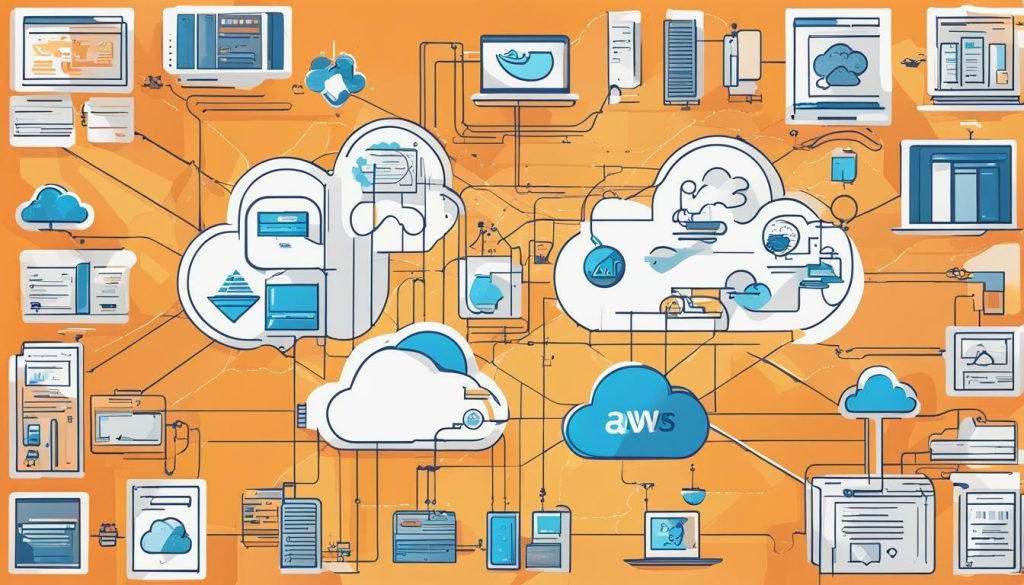
Azure Services: Exploring the Microsoft Cloud
As one of the major cloud service providers, Microsoft Azure offers a wide range of cloud computing solutions to businesses of all sizes. From compute and storage to networking and AI, Azure’s services aim to provide scalable and secure solutions that can meet the needs of modern organizations.
One of Azure’s most notable features is its integration with other Microsoft products like Office 365 and Dynamics 365. This makes it an attractive option for businesses that already rely on Microsoft technologies. Azure also offers hybrid cloud solutions, allowing organizations to seamlessly connect their existing infrastructure with the cloud.
Azure’s compute services include virtual machines, container services, and serverless computing through Azure Functions. Its storage options include blob storage, file storage, and disk storage. Azure’s networking services allow for virtual networks and load balancing, while its database services include Azure SQL Database and Cosmos DB for NoSQL databases.
Azure also offers a wide range of AI and IoT services, such as Azure Machine Learning, IoT Hub, and Event Grid. These services enable businesses to gain valuable insights from their data and build intelligent applications.
Overall, Azure’s comprehensive set of services and its strong integration with other Microsoft products make it a top choice for many businesses. However, its pricing can be complex and may require careful consideration.
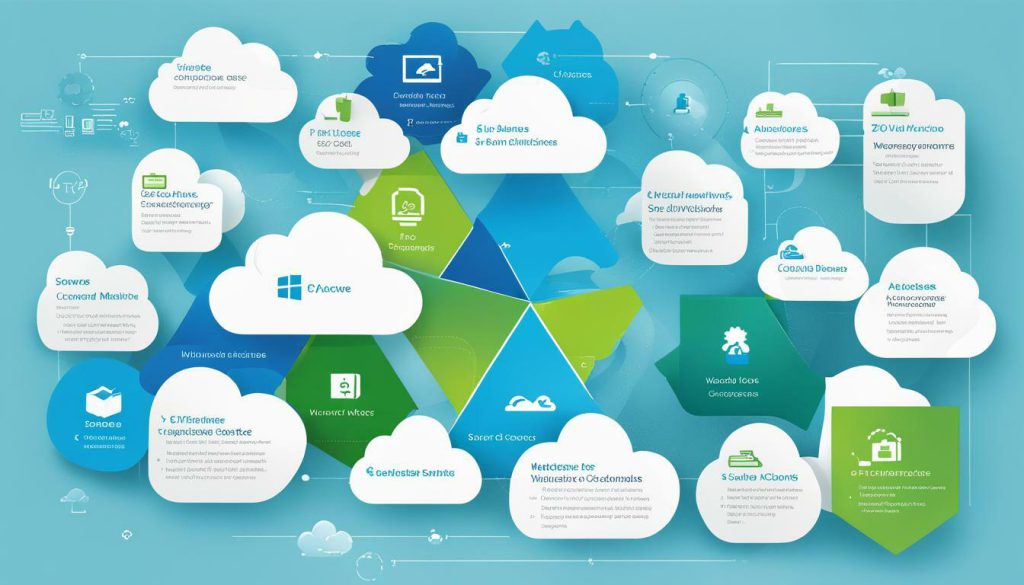
“Azure’s comprehensive set of services and its strong integration with other Microsoft products make it a top choice for many businesses.”
GCP Services: Unleashing Google’s Cloud Power
Google Cloud Platform (GCP) offers a wide range of services designed to support businesses of all sizes. From startups to large enterprises, GCP’s services can help organizations drive innovation, gain insights, and scale their operations.
GCP’s services are organized into various categories, including compute, storage, networking, databases, big data, machine learning, and more. Each category encompasses multiple services that address specific business needs. For instance, Compute Engine provides scalable virtual machines, while Kubernetes Engine offers a platform for managing containerized applications.
One of GCP’s standout services is Google BigQuery, a cloud-based data warehousing and analytics service that enables users to analyze massive datasets quickly. With BigQuery, businesses can gain insights into customer behavior, identify trends, and inform decision-making.
| Category | Services |
|---|---|
| Compute | Compute Engine, Kubernetes Engine, App Engine, Cloud Run, Cloud Functions |
| Storage | Cloud Storage, Cloud SQL, Cloud Bigtable, Cloud Spanner, Cloud Filestore, Persistent Disk |
| Networking | VPC, Cloud Load Balancing, Cloud DNS, Cloud CDN, Cloud Interconnect |
| Databases | Cloud SQL, Cloud Bigtable, Cloud Spanner, Cloud Memorystore |
| Big Data | BigQuery, Cloud Dataproc, Cloud Dataflow, Cloud Pub/Sub, Cloud Composer |
| Machine Learning | Cloud AI Platform, Cloud AutoML, Cloud Vision, Cloud Natural Language, Cloud Translation, Cloud Speech-to-Text, Cloud Video Intelligence, Cloud TPUs |
GCP also offers a range of security and compliance tools, including Identity and Access Management (IAM), Cloud Identity-Aware Proxy (Cloud IAP), and Security Command Center. These services help organizations ensure the security and compliance of their cloud infrastructure and applications.
Overall, GCP’s services are designed to meet the needs of businesses operating in a variety of industries. With its focus on innovation and scalability, GCP can be a valuable partner for organizations looking to leverage the power of cloud computing.

OCI Services: Oracle’s Cloud Offerings
In recent years, Oracle has made significant strides in the cloud computing market with its cloud solution, Oracle Cloud Infrastructure (OCI). OCI offers a comprehensive suite of cloud services, including compute, storage, networking, databases, analytics, security, and more. In this section, we will delve into the services available on OCI and highlight the advantages that Oracle brings to the cloud market.
Compute Services
OCI provides a range of compute services, including bare metal, virtual machines, and containers. Bare metal instances offer high performance and complete control over the underlying hardware, making it ideal for running mission-critical applications. Virtual machines provide flexibility and scalability, while container services enable organizations to build and deploy containerized applications easily.
Storage Services
OCI offers a variety of storage options, including block, object, and file storage. Block storage provides high-performance, low-latency storage for applications that require high I/O operations. Object storage offers scalable, durable, and highly available storage for unstructured data. File storage provides NFS-based file systems that can be easily mounted to virtual machines and bare metal instances.
Networking Services
Networking services on OCI include virtual cloud networks (VCN), load balancing, and DNS. VCN enables organizations to create customizable, private network topologies within the cloud. Load balancing services offer high availability and scalability for applications. DNS services provide reliable name resolution for internet-facing applications.
Database Services
OCI database services range from fully managed to self-managed solutions. Managed database services include Oracle Autonomous Database, which utilizes machine learning to automate database management tasks, and the Oracle Database Service. Self-managed options include Oracle Database on Virtual Machine and Oracle Database Exadata Cloud Service.
Analytics Services
OCI analytics services include Oracle Analytics Cloud, which provides business intelligence and data visualization capabilities, and Oracle Big Data Service, which enables organizations to process and analyze large amounts of data.
Security Services
OCI security services include network security, identity and access management, and security monitoring. Network security features include distributed denial of service (DDoS) protection and web application firewall. Identity and access management services provide centralized control and management of users and groups. Security monitoring services include logging, auditing, and threat detection.
Overall, OCI provides a robust set of cloud services that can meet the needs of a wide range of organizations. With its focus on performance, security, and flexibility, OCI is a viable option for companies that want to manage their cloud infrastructure with Oracle.
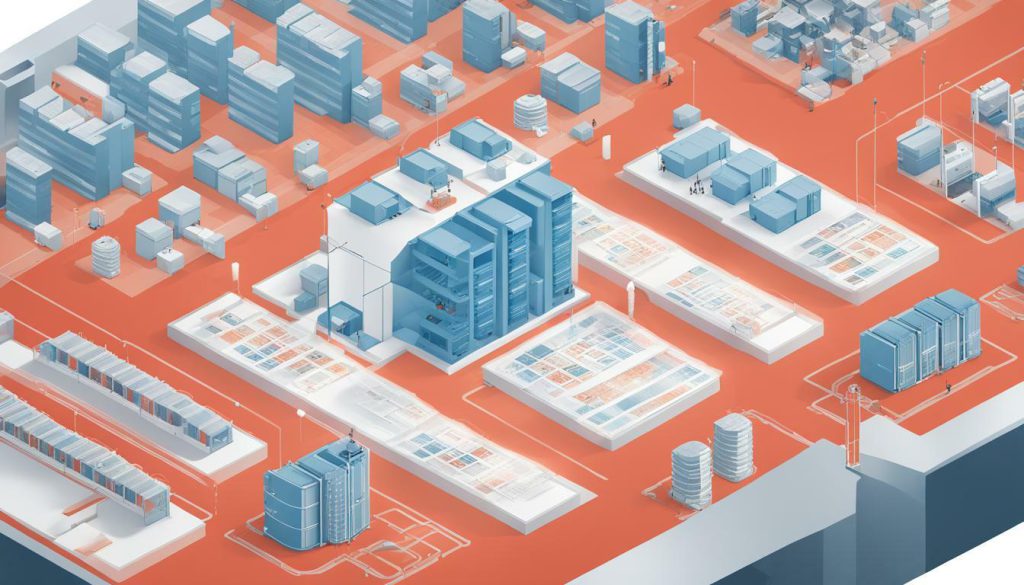
Feature Comparison: AWS vs. Azure vs. GCP vs. OCI
When it comes to cloud computing, businesses have several options to choose from. The four major cloud service providers are Amazon Web Services (AWS), Microsoft Azure, Google Cloud Platform (GCP), and Oracle Cloud Infrastructure (OCI). Each provider offers a range of cloud products and features that are designed to meet the needs of different businesses. Comparing these providers is important for businesses to make an informed decision about which cloud platform to choose.
Here is a comprehensive feature comparison of AWS, Azure, GCP, and OCI:
| Features | AWS | Azure | GCP | OCI |
|---|---|---|---|---|
| Compute | Elastic Compute Cloud (EC2) | Azure Virtual Machines | Compute Engine | Compute |
| Storage | Simple Storage Service (S3) | Azure Blob Storage | Cloud Storage | Object Storage |
| Database | Relational Database Service (RDS) | Azure SQL Database | Cloud SQL | Database Cloud Service |
| Network | Virtual Private Cloud (VPC) | Virtual Network | Virtual Private Cloud (VPC) | Virtual Cloud Network (VCN) |
| Big Data | Amazon EMR | Azure HDInsight | Cloud Dataflow | Big Data Cloud Service |
| Artificial Intelligence | Amazon SageMaker | Azure Machine Learning | Cloud AI Platform | AI Cloud Service |
| Price | Pay-as-you-go | Pay-as-you-go | Pay-as-you-go | Pay-as-you-go |
As seen in the comparison above, each of the four cloud service providers has its strengths and weaknesses. AWS has a broad range of products and services, making it an excellent choice for businesses that require flexibility and scalability. Azure is an excellent choice for businesses that require deep integration with Microsoft products and services. GCP is a great option for businesses that require advanced machine learning and data analytics capabilities. OCI is an excellent choice for businesses that require an enterprise-grade cloud infrastructure.
Businesses need to evaluate their specific needs and requirements when choosing a cloud platform. It is crucial to consider factors such as scalability, security, availability, and ease of migration. A thorough evaluation of the cloud product mapping can help businesses make an informed decision about which cloud service provider to choose.
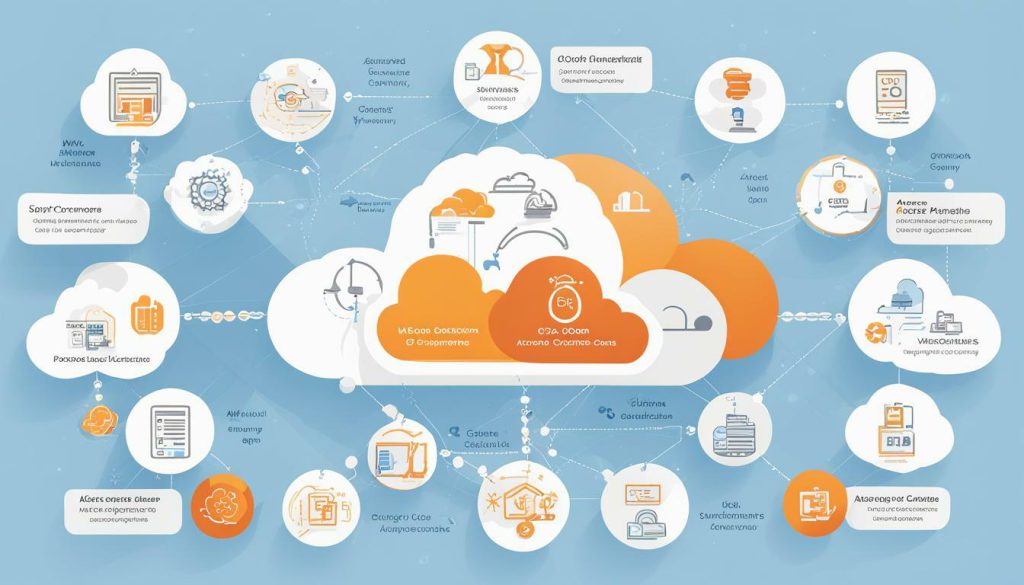
Tools and Services for Cloud Migration
Cloud migration is a complex process, and organizations need to consider numerous factors before implementing it. While many cloud service providers offer their own tools and services, there are also third-party vendors that specialize in cloud migration. Here, we will discuss some of the key tools and services that can help organizations make a smooth transition to the cloud.
AWS Services
Amazon Web Services (AWS) offers several services to help organizations migrate to the cloud. One of the most popular tools is the AWS Migration Hub, which provides a central location for tracking the progress of multiple migration projects. Other AWS migration services include AWS Server Migration Service, AWS Database Migration Service, and AWS Snowball, which is a physical device used for transferring large amounts of data to and from the cloud.
Azure Services
Microsoft Azure provides a range of tools and services to aid with cloud migration. Azure Site Recovery is a disaster recovery solution that can replicate virtual machines to the cloud. Azure Database Migration Service helps users move their databases from on-premises to the cloud. Azure Migrate is a central hub for planning and executing migrations.
GCP Services
Google Cloud Platform (GCP) provides several tools to simplify cloud migration. Google Cloud Migration is a service that helps migrate virtual machines from on-premises or other clouds to GCP. Google Transfer Appliance is a physical device that can be used to transfer large amounts of data efficiently and securely. GCP also offers a wide range of partner solutions for migration to GCP.
OCI Services
Oracle Cloud Infrastructure (OCI) offers multiple tools and services to simplify cloud migration. Some of the key ones include Oracle Cloud Infrastructure FastConnect, which offers a dedicated, private connection between on-premises infrastructure and OCI. Oracle Data Transfer Service is a fully-managed service that helps migrate large volumes of data. OCI Migration Services provides a range of migration tools and services for migrating workloads to OCI.
Multi-Cloud Strategy
When creating a multi-cloud strategy, it’s important to choose the right tools and services to manage your cloud infrastructure effectively. One option is to use a cloud management platform, such as RightScale or CloudHealth, which can help with workload management, cost optimization, and security. Another approach is to use a multi-cloud management tool, such as Komprise or Morpheus, which can help with orchestration and governance across multiple clouds.

Organizations should carefully consider their options when choosing tools and services for cloud migration. By evaluating their needs and goals, they can make an informed decision on which cloud service providers and tools are right for them.
Analyzing Cloud Costs: AWS vs. Azure vs. GCP vs. OCI
One of the critical factors to consider when choosing a cloud provider is the cost. Cloud computing can be expensive, and organizations must ensure that they select a provider that offers the best value for money. In this section, we will analyze the costs of four major cloud service providers: AWS, Azure, GCP, and OCI.
Cloud costs analysis is a complex process, and several factors influence the final bill. These factors include usage patterns, storage options, data transfer fees, compute instances types, and pricing models. Organizations need to identify their specific requirements and match them with the cloud provider’s pricing structure.
Let’s take a closer look at the pricing models offered by AWS, Azure, GCP, and OCI.
| Cloud Service Provider | Pricing Model |
|---|---|
| AWS | Pay-as-you-go, Reserved Instances, Spot Instances, and Dedicated Hosts. |
| Azure | Pay-as-you-go, Reserved Instances, and Spot Instances. |
| GCP | Pay-as-you-go, Sustained Use Discounts, and Committed Use Discounts. |
| OCI | Pay-as-you-go and Reserved Instances. |
AWS offers the most extensive range of pricing models, allowing organizations to choose according to their specific needs. Azure and GCP offer similar options, while OCI only provides pay-as-you-go and reserved instances pricing.
The compute instance types also significantly impact cloud costs. AWS, Azure, GCP, and OCI offer various instance types, which differ in terms of memory, CPU, and storage. Organizations must choose the most appropriate instance type for their workloads to optimize costs.
Another essential element of cloud computing cost analysis is data transfer fees. All cloud providers charge data transfer fees for data transferred between regions, services, and the internet. AWS and Azure offer free data transfer options within the same region, while GCP and OCI offer free data transfer within the same zone.
In conclusion, cloud costs analysis is a crucial factor when choosing a cloud provider. AWS, Azure, GCP, and OCI offer different pricing models and compute instance types, making it essential for organizations to identify their specific requirements and match them with the provider’s pricing structure. It’s also essential to factor in data transfer fees and other additional costs when analyzing cloud costs.
Performance Benchmarking: Evaluating Cloud Providers
When evaluating cloud service providers, performance benchmarking is a critical factor to consider. It involves measuring the performance of a cloud platform under different workloads and conditions to determine its suitability for a particular use case. In this section, we will compare the performance of AWS, Azure, GCP, and OCI using various benchmarking tools and metrics.
Latency
Latency is the time it takes for a request to travel from the client to the server and back. It is measured in milliseconds and can have a significant impact on the user experience. In a latency benchmark test conducted by Cedexis in 2016, AWS had an average latency of 27 ms, Azure had 31 ms, GCP had 33 ms, and OCI had 44 ms. However, it’s important to note that latency can vary depending on the region and availability zone.
Throughput
Throughput is the amount of data that can be transferred over the network per unit time. It is measured in Mbps and is an essential metric in performance benchmarking. In a recent test conducted by CloudHarmony, AWS had the highest throughput at 10 Gbps, followed by GCP at 5 Gbps, Azure at 3 Gbps, and OCI at 1 Gbps.
Availability
Availability is the percentage of time that a cloud platform is accessible and functioning correctly. It is crucial for mission-critical applications and services that require high uptime. In a 2020 study by Gartner, AWS had an availability of 99.99%, followed by Azure at 99.95%, GCP at 99.95%, and OCI at 99.95%.
Scalability
Scalability is the ability of a cloud platform to handle increasing workload demands without a decrease in performance. It is an essential aspect of cloud computing, and cloud providers must have the capability to scale horizontally and vertically. In a scalability test conducted by LoadStorm, AWS had the highest scalability at 5,000 users per second, followed by GCP at 4,000 users per second, Azure at 3,000 users per second, and OCI at 2,000 users per second.
Overall, AWS has consistently demonstrated the best performance across various benchmarking metrics. However, the results can vary depending on the use case and workload. Organizations should consider their specific requirements and conduct their performance benchmarking tests to determine the best cloud platform for their needs.

Key Considerations for a Multi-Cloud Strategy
A multi-cloud strategy involves using multiple cloud service providers to distribute workloads and minimize the risk of vendor lock-in. It allows organizations to take advantage of the unique features and capabilities of each cloud platform, avoiding the limitations of a single provider.
When implementing a multi-cloud strategy, organizations must carefully consider several factors:
- Cloud Service Providers: Choose cloud providers that align with your business needs and objectives. Consider the strengths and weaknesses of each provider in relation to your workload requirements.
- Cloud Computing: Ensure that the cloud platforms you choose can support your workload requirements, such as performance, scalability, and availability.
- Cloud Comparison: Compare the features and pricing of each cloud provider to determine the most cost-effective solution for your organization.
In addition to these considerations, organizations must also ensure that they have the necessary skills and expertise to manage multiple cloud platforms. Investing in training and education for your IT team can help ensure a successful multi-cloud strategy.
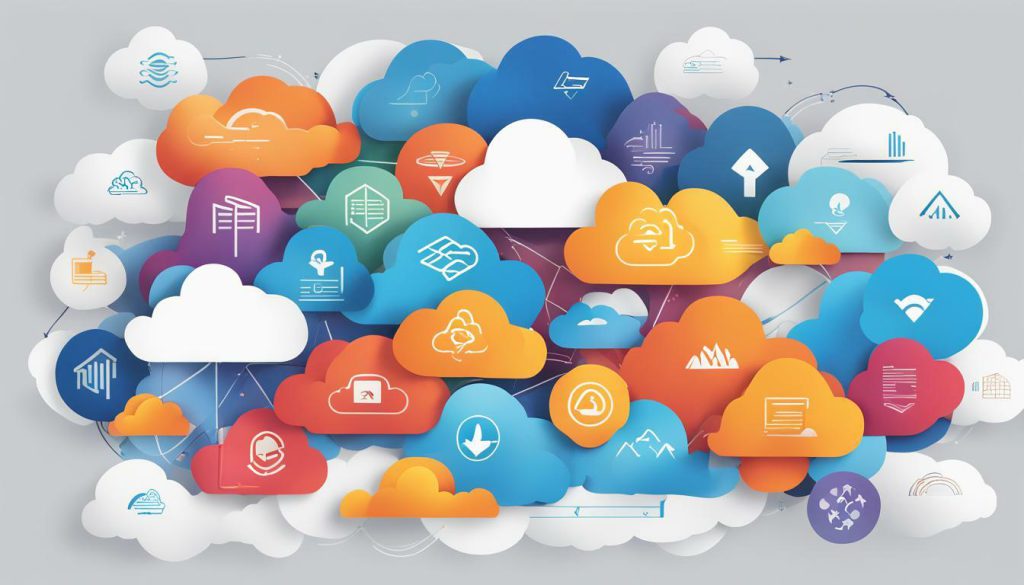
“A multi-cloud strategy allows organizations to take advantage of the unique features and capabilities of each cloud platform, avoiding the limitations of a single provider.”
Conclusion
In conclusion, selecting the right cloud platform requires careful consideration of a variety of factors, ranging from scalability and security to cost and performance. Cloud product mapping is a critical step in comparing and evaluating different cloud service providers, and this article has provided a comprehensive overview of the four main players in the market – AWS, Azure, GCP, and OCI.
When evaluating cloud solutions, organizations must first identify their specific needs and goals. AWS offers a broad range of services, while Azure leverages the strengths of the Microsoft ecosystem. GCP provides powerful machine learning and big data capabilities, and OCI combines robust security with high-performance computing.
Comparing cloud providers based on features, costs, and performance is essential to making an informed decision. Organizations should also consider the tools and services available for cloud migration, as well as the benefits and challenges of a multi-cloud strategy.
In summary, a successful cloud migration requires careful planning, evaluation, and execution. By leveraging the insights provided in this article, organizations can select the best cloud solution to meet their specific needs and achieve their business objectives.
FAQ
Q: What is cloud product mapping?
A: Cloud product mapping refers to the process of comparing and evaluating different cloud service providers to determine which one offers the best solutions for your organization’s needs. It involves examining factors such as features, pricing, performance, and compatibility to make an informed decision.
Q: Why is it important to compare different cloud service providers?
A: Comparing different cloud service providers allows organizations to assess the strengths and weaknesses of each platform. It helps in identifying the features and capabilities that align with specific business requirements, ensuring that you choose the right cloud provider for your needs.
Q: Which are the main players in the cloud market?
A: The main players in the cloud market are Amazon Web Services (AWS), Microsoft Azure, Google Cloud Platform (GCP), and Oracle Cloud Infrastructure (OCI). These providers offer a wide range of services and have a significant market share in the cloud computing industry.






